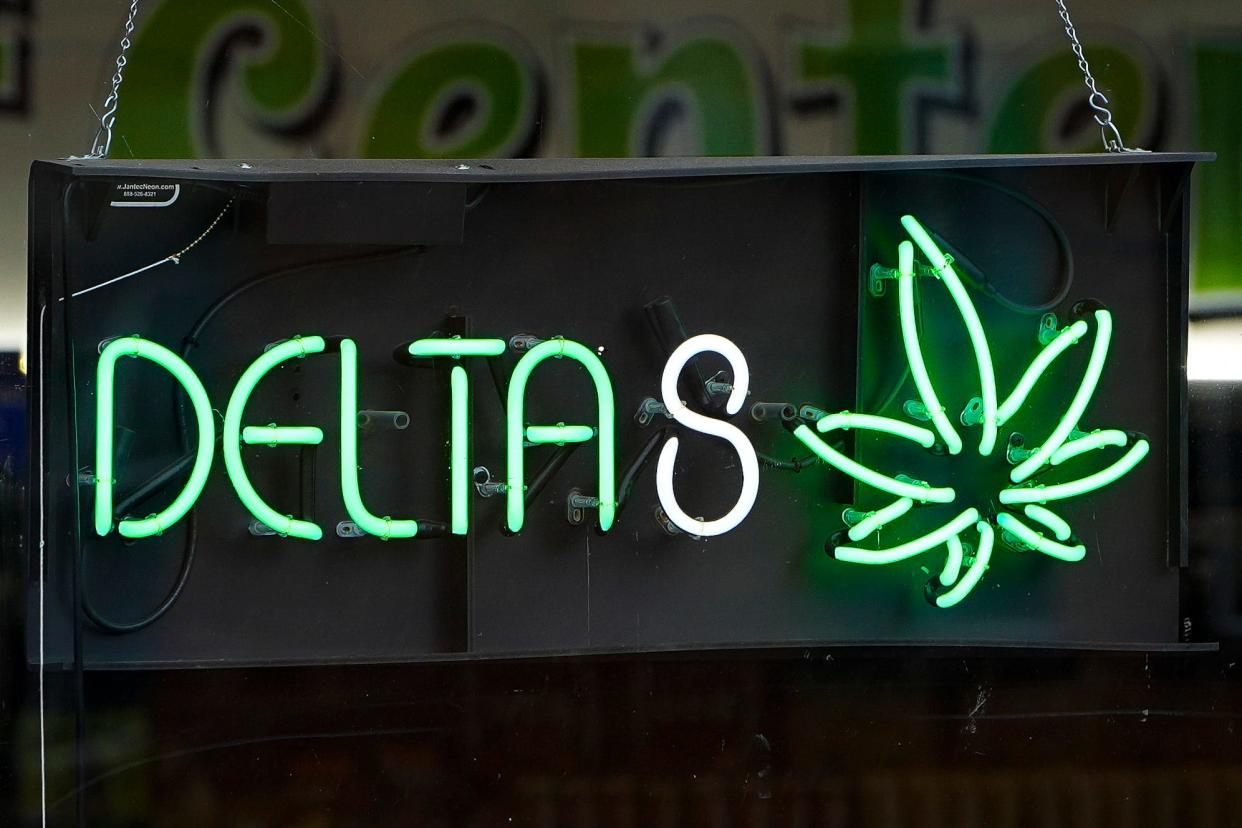What is delta-8 THC, and why does Mike DeWine want to crack down on it in Ohio?

- Oops!Something went wrong.Please try again later.
You may have seen delta-8 advertised in neon lights at your local convenient store or head shop, or maybe you’ve heard a friend talking about somehow buying “legal weed” before Ohio’s recreational marijuana rollout.
They're talking about something called delta-8. And they're right. It's perfectly legal. But what exactly is delta-8, and why is Ohio Governor Mike DeWine talking about banning it in Ohio?
What are delta-8 THC products?
Delta-8 is a synthetic cannabinoid derived from hemp and sold in edibles, vapes, drinks and more. It’s chemically similar to delta-9 THC, the more powerful intoxicant that gives traditional marijuana products — like edibles, vapes and drinks — their psychoactive kick.
Related story: Gov. Mike DeWine wants to crack down on delta-8 THC products.
Delta-8 is federally legal and is widely available for purchase online and in stores. It isn’t regulated or approved by the Food and Drug Administration, which has raised concerns about delta-8 being marketed with unsubstantiated therapeutic claims.
Can delta-8 get you high?
Yes. Just not as much as delta-9 THC.
Experts say delta-8 tends to be about a third to a quarter less potent than delta-9 – so it still certainly has an effect. The two cannabinoids connect to the same receptor in the brain to cause intoxication, but delta-8 has a weaker connection. That’s how it earned nicknames like “diet weed” and “weed lite.”
Like delta-9 THC, delta-8 can cause feelings of euphoria and relaxation, relieve anxiety, increase appetite and lessen pain. It also has some of the same drawbacks – it could make you drowsy, increase your anxiety (instead of relieving it), and causes side effects such as dry mouth, bloodshot eyes, lethargy or disorientation.
How is delta-8 different from CBD?
Both delta-8 and CBD are derived from hemp, but CBD does not cause a high.
CBD is still psychoactive, however, meaning it can still impact your mood and behavior. CBD is a popular sleep and relaxation aid, and some people find it helpful for pain relief. It’s less likely to increase anxiety or cause certain other common THC side effects.
CBD is naturally present in hemp, and doesn't need to be synthesized like delta-8.
Both CBD and delta-8 are federally legal.
How is delta-8 legal?
Delta-8 exists in a legal gray area. Technically, the substance is legal because it comes from hemp, a crop that’s legal to grow in the US.
Hemp is a variety of marijuana plant that contains 0.3% or less THC. Growing hemp was legalized as part of the 2018 Farm Bill.
Hemp plants are grown for fiber, grain, seeds and CBD. The CBD in the hemp can be converted into delta 8 THC.
Currently, delta-8 is federally legal. Fifteen states -- Alaska, Arizona, Colorado, Delaware, Idaho, Iowa, Montana, Nevada, New York, North Dakota, Oregon, Rhode Island, Utah, Vermont, and Washington – have banned delta-8. Others have passed regulations and restrictions on the substance’s sale.
Is delta-8 safe?
We know relatively little about its long-term effects. Delta-8 THC has not been evaluated or approved by the FDA, and its production is not regulated.
The FDA says it received 104 adverse event reports involving delta-8 between December 1, 2020, and February 28, 2022. Those adverse events included hallucinations, vomiting, tremor, anxiety, dizziness, confusion and loss of consciousness.
Across the same time range, national poison control centers received 2,362 exposure cases of delta-8 products, 41% involving children.
Some have raised concerns about the chemicals used to synthesize delta-8 THC. The FDA notes that byproducts of the chemicals used in the process could be harmful.
It’s also unclear whether delta-8 could cause cannabinoid hyperemesis syndrome, a condition that causes episodes of intense vomiting in chronic, high-dose cannabis users.
Many aficionados believe regulators and the general public are overcautious about delta-8, saying the substance is less dangerous than alcohol, which is very much legal and responsible for 140,000 deaths per year. To them, delta-8 is a legal alternative that allows them to relax without the sometimes devastating effects of alcohol use.
Regardless, delta-8 should be kept away from pets and children.
bagallion@dispatch.com
This article originally appeared on The Columbus Dispatch: What is delta-8 THC, the product DeWine a crack down on in Ohio?

